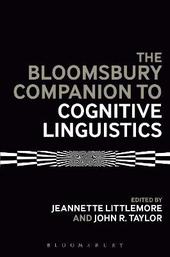
|
The Bloomsbury Companion to Cognitive Linguistics
Hardback
Main Details
| Title |
The Bloomsbury Companion to Cognitive Linguistics
|
| Authors and Contributors |
Edited by Jeannette Littlemore
|
|
Edited by Dr John R. Taylor
|
| Series | Bloomsbury Companions |
|---|
| Physical Properties |
| Format:Hardback | | Pages:384 | | Dimensions(mm): Height 234,Width 156 |
|
| Category/Genre | Psycholinguistics
Semantics |
|---|
| ISBN/Barcode |
9781441195098
|
| Classifications | Dewey:401.9 |
|---|
| Audience | | Tertiary Education (US: College) | | Professional & Vocational | |
|---|
|
Publishing Details |
| Publisher |
Bloomsbury Publishing Plc
|
| Imprint |
Bloomsbury Academic USA
|
| Publication Date |
19 June 2014 |
| Publication Country |
United States
|
Description
The Bloomsbury Companion to Cognitive Linguistics is a comprehensive and accessible reference resource to research in contemporary cognitive linguistics. Written by leading figures in the field, the volume provides readers with an authoritative overview of methods and current research topics and future directions. The volume covers all the most important issues, concepts, movements and approaches in the field. It devotes space to looking specifically at the major figures and their contributions. It is a complete resource for postgraduate students and researchers working within cognitive linguistics, psycholinguistics and those interested more generally in language and cognition.
Author Biography
Jeannette Littlemore is a Reader in Applied Linguistics at the University of Birmingham, UK. She is the author of Applying Cognitive Linguistics to Second Language Learning and Teaching (2009). John R. Taylor is Professor of Linguistics at the University of Otago, New Zealand. He is the author of Linguistic Categorization (2003), An Exploration in Cognitive Grammar (1996) and Cognitive Grammar (2002).
ReviewsHighly recommended to anyone interested in Cognitive Linguistics, conceptual metaphor theory, and the application of usage-based linguistics in language pedagogy and beyond. -- Stefan Hartmann, Johannes Gutenberg-Universitat Mainz * LINGUIST * This is a resource book for both beginners and advanced researchers in Cognitive Linguistics. It covers the basic topics as well as the current trends in Cognitive Linguistics. It includes the founding fathers' elaboration on their own very original theories that started the enterprise as Cognitive Linguistics as well as those currently active scholars' theories that have emerged in the progress of Cognitive Linguistics in the past few decades. This book should occupy a permanent place on every cognitive linguist's bookshelf. -- Thomas Fuyin Li, Professor of Linguistics, Beihang University, China and Editor of International Journal of Cognitive Linguistics. This companion is a substantial and timely addition to the literature on Cognitive Linguistics. Its scope and depth make it attractive both for newcomers to the field and for established researchers. The section on New Directions and Applications, in particular, showcases some of the most promising and fascinating current developments in this expanding area of research. -- Elena Semino, Professor of Linguistics and Verbal Art, Lancaster University, UK This research companion provides an excellent state-of-the-art overview of contemporary cognitive linguistics. It introduces the reader to foundational cognitive linguistic frameworks such as cognitive grammar and construction grammar, conceptual metaphor, conceptual metonymy, and conceptual blending, as well as applications of cognitive linguistics in language acquisition and pedagogy, and recent advances in quantitative corpus linguistics. It will be an invaluable source of information and inspiration for the general reader and specialist alike. -- Klaus-Uwe Panther, Distinguished Visiting Professor of English Linguistics, Nanjing Normal University, China, and Professor Emeritus of English Linguistics, University of Hamburg, Germany ...most major topics are discussed in great depth. Also, it incorporates topics that are largely ignored in the established Cognitive Linguistics handbooks, e.g. variationist linguistics and non-linguistic applications of cognitive-linguistic concepts. It is therefore highly recommended to anyone interested in Cognitive Linguistics, conceptual metaphor theory, and the application of usage-based linguistics in language pedagogy and beyond. -- Stefan Hartmann * The Linguist List *
|